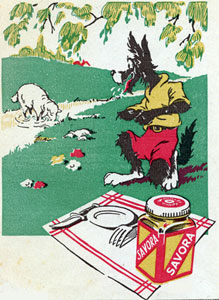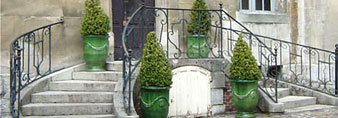THE TOWN RAT AND THE COUNTRY RAT (I,9)
A city rat upon a day,
Invited from his curds
A country rat, in courteous way,
To pick the bones of birds.
The cloth on Turkey-carpet spread
With sundry odds and ends ;
I think it need not here be said,
How happy were these friends !
It was a most genteel repast,
Where Plenty held her reign,
But ah ! a noise their mirth o'ercast,
As they were in the vein.
Hard at the door that noise was heard,
The town rat ran away,
The rustic also something stirred
Advising not to stay.
The noise was hushed, the town rat grew
Bold, and brought back his guest.
“ Come ”said the cit, inspired anew,
Let's now eat up the rest. ”
“ I've quite enough, ” the rustic cried,
“ To-morrow dine with me ;
Not that I feast in regal pride,
Or e'er such dainties see ;
“ But at my leasure still I eat,
There’s nought to damp my cheer ;
Away with fests, however great,
That may be spoiled by fear. ”
THE WOLF AND LAMB. (I,10)
Strength upon right with ease can trample,
As will appear by this example.
A gentle lamb to quench his thirst,
Came to a calm, transparent brook ;
A hungry wolf, in hour accurst,
That spot for his adventures took :
“ Rash creature ! ” cried he in. a rage,
“ To trouble thus the waters as they flow,
While I my thirst assuage ;
I’ll punish thee, insulting little foe ! ”
“ I pray your majesty, ” the Lamb replied,
“ Not to be angry, but observe the tide.
You stand above, and I below ;
The water comes to me from you :
How can I trouble what you drink ? ”
“ But I insist, ” he said, “ you do :
And I remember, now I think,
A year ago you treated me with scorn. ”
“ How could I ? I was not then born, ”
Replied the Lamb. “ Perhaps, ” said Wolf—“ agreed ;
It was your brother then, who was so bold. ”
“ I have no brother, sire, indeed. ”
“ 'Twas some one of your family, I’m told,
For all of you dislike my breed,
Yourselves, your shepherds, and your curs ;
But I'll have vengeance, my fine Sirs ! ”
He said, not caring with more words to meet him,
And bore the lamb into the wood to eat him
|
|
|
|
TO THE DUKE DE LA ROCHEFOUCAULD. (I,11)
A man unrivalled in his own conceit,
Himself for finest in the world did take, Accused the clearest mirrors of deceit,
Lived more than pleased in his profound mistake.
While meddling fate to cure him tries,
Ever presenting to his eyes
The silent monitors that teach the fair ;
Minors in chambers and in shops,
Pocket mirrors found on fops,
Mirrors that ladies on their sashes wear.
What could Narcissus do ? He lived enshrined
In the most hidden places he could find ;
Nor dared to risk the proof of mirrors more.
But in the lonely walks he took,
He chanced to see a limpid brook,
Perceived himself—and looks of anger wore ;
Yet thought it some chimera vain,
And strove to quit the brook again ;
But how ! from water clear as glass,
Could he without an effort pass ?
I hope my drift is not obscure :
I speak to all—mirrors we can't endure,
Each to extreme in the fond evil goes ;
Our mind's the man--there self-conceit arose ;
The mirrors are the follies seen of others,
Mirrors that show that our defects are brothers :
Let all then know who wish to look,
The Book of Maxima is the Brook. |

The wolf and lamb (Advertising image)
|
THE DRAGON WITH MANY HEADS,
AND THE DRAGON WITH MANY TAILS (I,12)
An envoy of the Porte, as they record,
One day at court, before the Emperor's nose,
Said that in vain the Empire's armies vied
With those of his great Lord.
On which a German rose and cried
“ Our prince has more than one dependant round,
Powerful to his allegiance bound,
And each an army keeps at his expense.”
The Turk replied—he was a man of sense‑
“ I know by fame what they can do,
The troops that your Electors find,
And that brings to my mind,
A droll affair, which by the by is true.
“ Once, placed in safety, I beheld pass by
Along a hedge a hundred-headed creature ;
Enough to make the world afraid, thought I ;
It froze my blood and started every feature.
I lost my fears, however, as I gazed ; -
For never could the body of the beast
Get through the hedge, on mine to feast ;
So loft me with the wild conceit it raised.
When lo ! a dragon, with a single head,
But tails I wot a goodly crew !
Came now in view!
With fright and horror seized, I lay for dead !
He passed the hedge, head, body, every tail,
And marched with ease the other to assail.”
“ Our frontiers are the hedge, the line ;
One beast's your Emperor, the other's mine.” |
|



